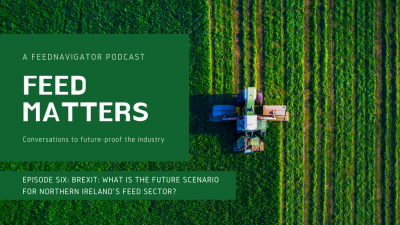No deal Brexit ‘disproportionately worse for NI’ says Thompson’s CEO

“The UK market will not see the pressures that exist in Northern Ireland because the UK is a net importer and Northern Ireland an exporter of meat and dairy. Northern Ireland will suffer disproportionately to the rest of the UK; I don’t think London policy makers appreciate that,” Billington told FeedNavigator this week.
Although the risk of the UK crashing out of the EU without a deal last Friday has been temporarily averted, unless MPs ratify Theresa May’s deal or a compromise deal in the coming weeks or months, a no deal Brexit is still a possibility.
“I think if MPs can agree to a trading arrangement, the withdrawal agreement will pass, but how close do you have to sail to the wire before Parliament realizes there could be a no deal? I am optimistic there will be a deal but still think there is a real risk of the UK accidentally ‘staggering’ into a no deal situation,” he said.
Billington’s favored outcome would be May’s withdrawal deal in conjunction with a customs union between the UK and EU as this would protect producers in Northern Ireland from the threat of cheap imports.
Worst case scenario for the Northern Irish feed and farming industry would be a no deal Brexit.
“Stark is the word I would use,” said Billington.
Some £850m (US$1.09m) of Northern Irish produce travels south every year, including one third of the milk produced by the country’s dairy farmers. These exports would be subject to duties that would price them out of the market, pushing farmers into crisis.
“A third of our dairy farmers may not survive,” said Billington.
He paints an equally grim picture for Northern Ireland’s meat and poultry producers, saying: “all our meat and dairy producers would face uneconomic price falls”.
No deal tariff raises new concerns
The no deal tariff schedule published by the UK government last month has raised additional new concerns. Under the regime, agricultural goods would be able to move from the Republic of Ireland into Northern Ireland tariff free, potentially wiping out any post-Brexit home market dividend for Northern Ireland farmers.
“Under this regime we would see negative pricing due to an oversupply of meat into the Northern Irish market as farmers take advantage of the taxation differential,” said Billington.
“An increased flow of goods into the UK via Northern Ireland would result in congestion around the Belfast ports and businesses bidding for space on vessels. Northern Ireland businesses would face prohibitively high delivery costs to supply the UK market.”
If the worst happens, and Northern Ireland’s farming industry descends into crisis, the feed industry’s dilemma will be whether it can continue supplying this market and increasing its exposure to bad debts – a decision that will largely be determined by the insurance industry’s willingness (or lack of) to provide cover, according to Billington.
“If no deal lasts any time, we will have decisions to make about whether we can supply customers who are losing money hand over fist,” he said.
Phyto sanitary regulations: the great unknown
“Even if the tax issue can be overcome, there is still the phyto sanitary issue to contend with. It’s a big unknown because nobody knows what the border inspection process would be. It would be a problem for us trading south but even worse for meat and dairy farmers,” said Billington.
The impact that phyto sanitary requirements would have on Northern Ireland’s export agrifeed grain trade in the event of a no deal Brexit is an area that deeply concerns the Northern Ireland Grain Trade Association (NIGTA).
“About 7% or 175,000 metric tons of Northern Ireland’s agrifeed grain production is shipped south. Without a deal, the default is that the UK becomes a third country and is subject to third country regulations such as phyto sanitary requirements .Our concern is how this will affect our ability to export,” Robin Irvine, NIGTA CEO, told this publication.
He continued: “Each manufacturing site will have to satisfy the requirements of an EU audit. The problem is that European inspectors won’t come to the UK to carry out audits, so operators will need to have the ability to host full audits outside of the UK on their processes and raw materials provenance. That is a significant hurdle and it will only be the very big companies who can justify the investment. It will knock out all border businesses on both sides as it is a complication they won’t be able to cope with.”












